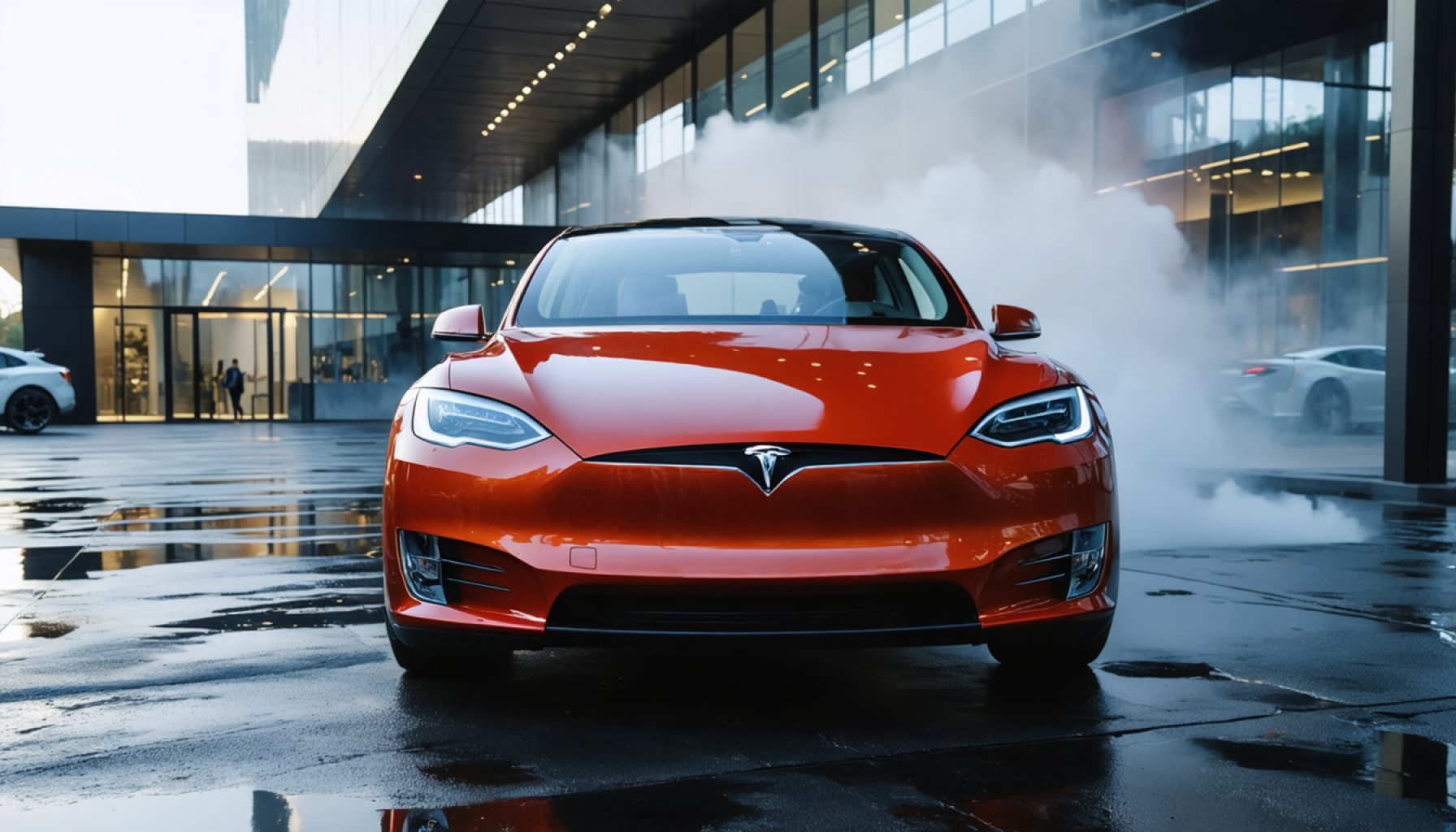- The strategic placement of Tesla showrooms in affluent urban areas, once a marketing strength, has now placed Tesla in a cultural conflict.
- Public discontent with government service cuts has unexpectedly turned Tesla showrooms into protest hotspots due to their accessibility and visibility.
- Activists are leveraging the showrooms’ central locations to stage demonstrations, affecting potential buyers’ purchasing decisions.
- Originally designed to attract informed and affluent eco-conscious consumers, the showrooms now amplify calls for social change from their target demographic.
- Tesla’s connection to Elon Musk, a polarized figure, intensifies the public’s response, linking the brand to broader political and social debates.
- This situation highlights the risk of tightly interwoven brand identities and the unforeseen consequences of business strategies within dynamic social environments.
America’s discontent with recent government service cuts has found a surprising arena: Tesla showrooms. As the public voices its displeasure, an unexpected narrative unfolds, highlighting how Elon Musk’s strategic showroom placements may have inadvertently placed his company in the center of a cultural storm.
Tesla’s story is one of innovation, as much in marketing as in engineering. When faced with restrictive dealership laws, Elon Musk sidestepped tradition, turning Tesla’s bricks-and-mortar presence into elegant galleries. These 276 showrooms dot enticing urban landscapes across the United States, embedded within affluent neighborhoods buzzing with potential buyers. The minimalistic design and central locations made them perfect lures for eco-conscious urban pioneers.
Yet, these appealing locations have now turned into Tesla’s Achilles heel. The showrooms’ strategic position – once an advantage – now places them in the eye of the storm, as public frustration over federal service cuts mounts.
Amidst this public uproar, activists have pinpointed Tesla stores as prime protest spots. Unlike typical sprawling car lots on city fringes, Tesla’s urban galleries sit at bustling crossroads. The mix of proximity to pedestrian traffic and prime visibility makes them perfect stages for demonstrations. Protestors line sidewalks, distributing messages that spur a reconsideration of purchasing decisions among potential buyers.
The irony lies in the galleries’ intended allure; designed for informed progressives and affluent buyers, these spaces now echo with calls for change from the very demographic they sought to attract.
Musk’s vision of a seamless buying experience—where transactions are consummated online away from the hustle of noisy lots—has instead become a loud amplifier of the public’s displeasure.
The wave of dissent caught significant momentum, bolstered by Tesla’s symbolic connection to Musk, a contentious figure amidst political and social debates. As Tesla’s own showrooms become stages for protest, each demonstration feeds into a narrative of resistance against perceived social injustices.
This situation underscores a compelling lesson in the interconnectedness of business strategies and social climates. In a world where brand identity and corporate actions are tightly interwoven, even the most cleverly conceived strategies can pivot unexpectedly. Tesla’s story serves as a reminder that while location is vital in retail, it’s just as crucial in the theater of public opinion.
Tesla’s Showrooms: From Marketing Masterstroke to Unwitting Protest Stages
Understanding Tesla’s Showroom Strategy
Tesla’s innovative approach to circumvent traditional dealership networks was both strategic and disruptive. By creating showrooms in prime urban areas, Tesla aimed to enhance brand visibility and attract technology-savvy, environmentally conscious consumers. These showrooms, akin to art galleries, emphasize the sleek design and advanced technology of Tesla vehicles, providing a unique retail experience that was not possible in conventional car dealerships.
Market Forecasts & Industry Trends
The automobile industry is shifting towards electric vehicles (EVs) at an unprecedented rate. With governments worldwide setting stricter emissions regulations and offering incentives for EV adoption, the demand for electric vehicles is poised for exponential growth. According to BloombergNEF, EVs could represent a third of global vehicle sales by 2030. Tesla, as a market leader, is well-positioned to capitalize on this trend, provided it navigates emerging market dynamics and societal challenges effectively.
Real-World Use Cases
Tesla’s showroom strategy highlights several real-world applications:
– Urban Retail Evolution: Tesla’s showrooms underscore a retail shift towards more engaging and experiential environments, especially in high-density, affluent urban areas.
– Real Estate as Branding Tool: Prime location choices contribute to the brand’s image of luxury and innovation, integrating seamlessly into consumers’ lifestyle perceptions.
Controversies & Limitations
– Public Protests: The protest movement at Tesla showrooms highlights a significant limitation of urban location strategies, which is the increased potential for becoming protest hotspots. This unintended consequence reflects the broader public dissatisfaction and societal tension.
– Dependency on Location: While these locations enhance visibility, they also mean that any negative public sentiment towards the brand or its figurehead can become highly visible.
Security & Sustainability
Tesla’s business model is rooted in sustainability; however, maintaining security for its urban showroom locations has become increasingly challenging amidst protests. It’s crucial for Tesla to establish protocols that ensure the safety of both employees and customers, reflecting a commitment to community engagement and responsible business practices.
Insights & Predictions
Given the increasing visibility of climate change advocacy and socio-political movements, Tesla showrooms will continue to serve as platforms for activism. Companies may need to enhance community engagement efforts to ensure sustainability objectives align with broader social goals. Moreover, Tesla’s strategic adaptation to address these disruptions could serve as a benchmark for other brands in similar predicaments.
Actionable Recommendations
1. Community Engagement: Establish dialogue channels with local communities to address concerns and portray Tesla as a proactive and responsible corporate citizen.
2. Flexible Retail Strategies: Consider diversifying showroom locations to mitigate concentration in high-protest areas while evaluating remote customer engagement methods augmented by virtual reality.
3. Crisis Management Training: Equip showroom staff with conflict resolution and crisis management skills to handle protest situations diplomatically.
Quick Tips for Prospective Buyers
– Research Showroom Alternatives: If apprehensive about encountering protests, explore online options or consult virtual showroom tours to understand Tesla’s offerings.
– Stay Informed: Engage with news surrounding Tesla’s social and environmental impact to align personal values with purchase decisions.
For more information about Tesla, visit their official website: link name.
